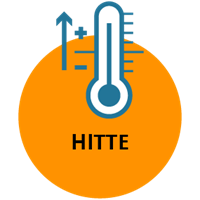Impact on public health
Most people are familiar with mild symptoms caused by extreme temperatures or continuous heat: lack of concentration, headaches, fatigue. Heat-related health issues are also referred to as heat stress. However, heat may also have a more severe impact, especially on the elderly and the mentally or physically impaired, who may even die from heat stress. The paragraphs below explain how to recognise heat stress, who are especially vulnerable to the impact of heat, and what is known about the relationship between heat and public health.
How do you recognise heat stress?
Heat stress can occur in mild and severe forms. Overheating primarily means that you must drink sufficient water and need to take it easy. Heat exhaustion calls for resting, drinking water, and cooling your body. If someone suffers a heat stroke, you need to call the emergency number [in the Netherlands: 112]. Do you want to know how to recognise the various symptoms of heat stress and what exactly you need to do? Read the flyer on Heat and Public Health compiled by the National Institute for Public Health and the Environment RIVM. The Covid situation is complicating the tackling of heat issues. The Red Cross website features tips on dealing with heat during Covid. Furthermore, the Red Cross organises workshops on dealing with extreme heat.
Who are most vulnerable?
The most vulnerable to heat are persons over 75 and persons suffering from a physical or mental impairment. According to Statistics Netherlands data, the 2020 heatwave resulted in increased mortality in convalescent or nursing homes, institutions for persons with disabilities, and institutions for mental health care. Young children, those working outdoors, and sportspeople are also at risk on hot days.
As a result of their decreased thirst response, elderly people have a higher risk of dehydration. Medications such as diuretics raise their vulnerability to dehydration even further. Other medications can also have an adverse effect during heat. Furthermore, heat takes an additional toll on people suffering from heart, lung, or kidney conditions. For example, on hot days, physical exertion will readily cause tightness of the chest among people with lung conditions.
Loneliness increases vulnerability to heat
In summer, many elderly people tend to feel lonelier than in other seasons. This “summer loneliness” can primarily be attributed to the fact that their permanent care givers are away on holiday, whilst their day centres will be closed for the summer. Summer loneliness also increases their vulnerability to heat, as no one is keeping an eye on them. Several initiatives have been set up to counteract loneliness; see the One against Loneliness programme of the Ministry of Health, Welfare and Sport. The Climate Adaptation Services foundation, TAUW, and Klimaatverbond Nederland have developed a heat and loneliness map which enables municipalities to identify neighbourhoods housing a large number of residents who are vulnerable to heat.
What is known about heat-related mortality?
The paragraphs below list a number of studies into the relationship between heat and mortality:
- According to international studies, one third of heat-related deaths in the Netherlands can be attributed to climate change.
- The report on Data analysis of heat-related mortality published by HKV consultants and Statistics Netherlands uses long-term data analysis to investigate the trends in heat-related mortality. In addition to outdoor temperature, other contributing factors are, e.g., the duration of a period of heat.
- According to a study by, inter alia, Ghent University and Wageningen University & Research, drought renders a heatwave hotter yet also less lethal, as drought reduces humidity. Lower humidity decreases the risk of overheating, as perspiration helps us to cool our body temperature.
